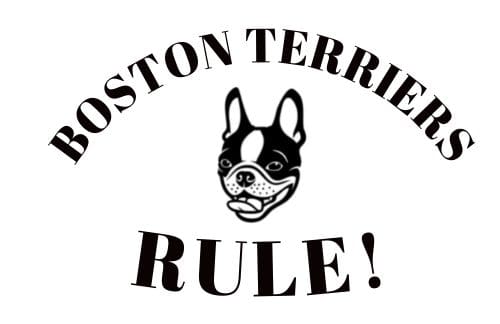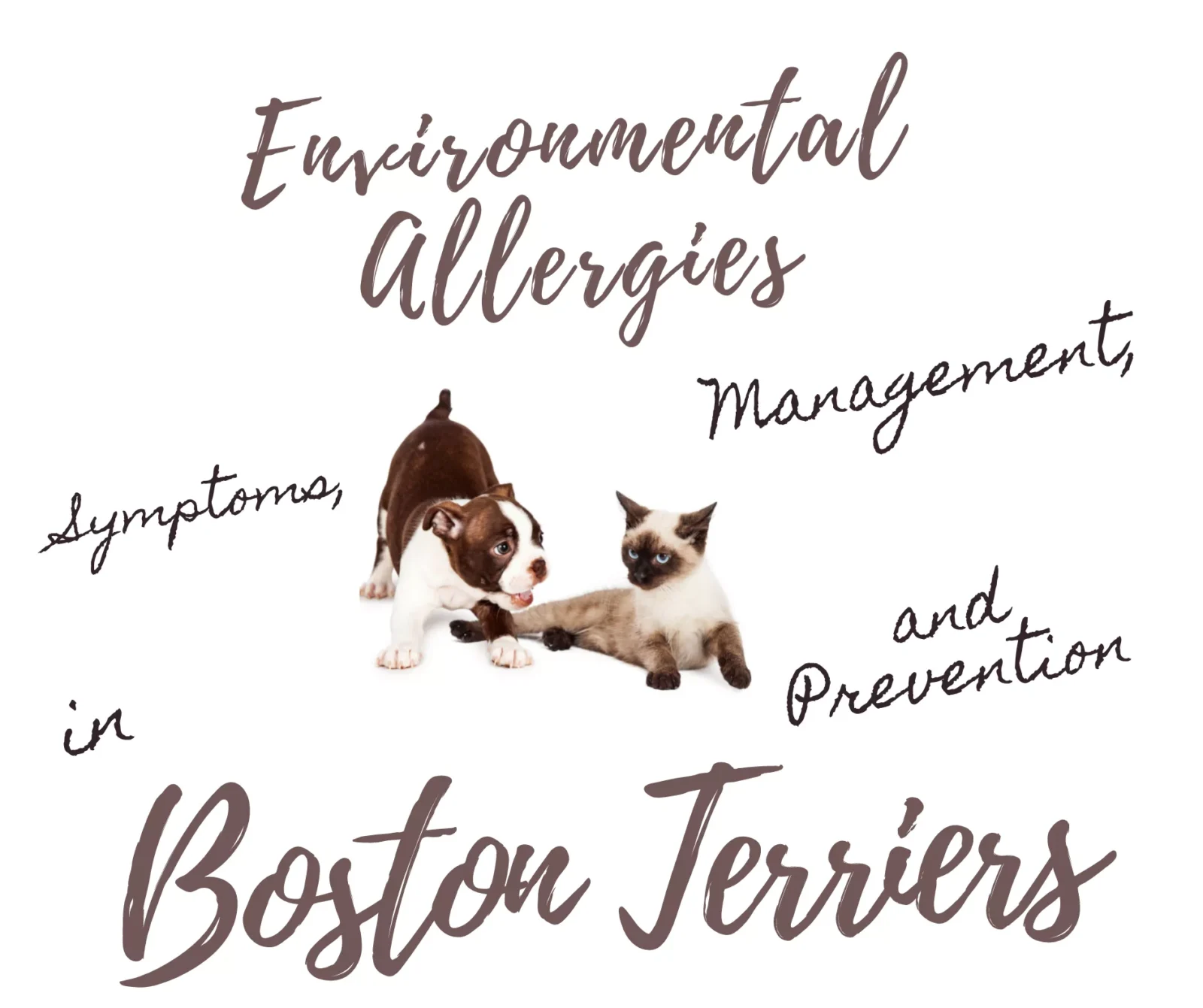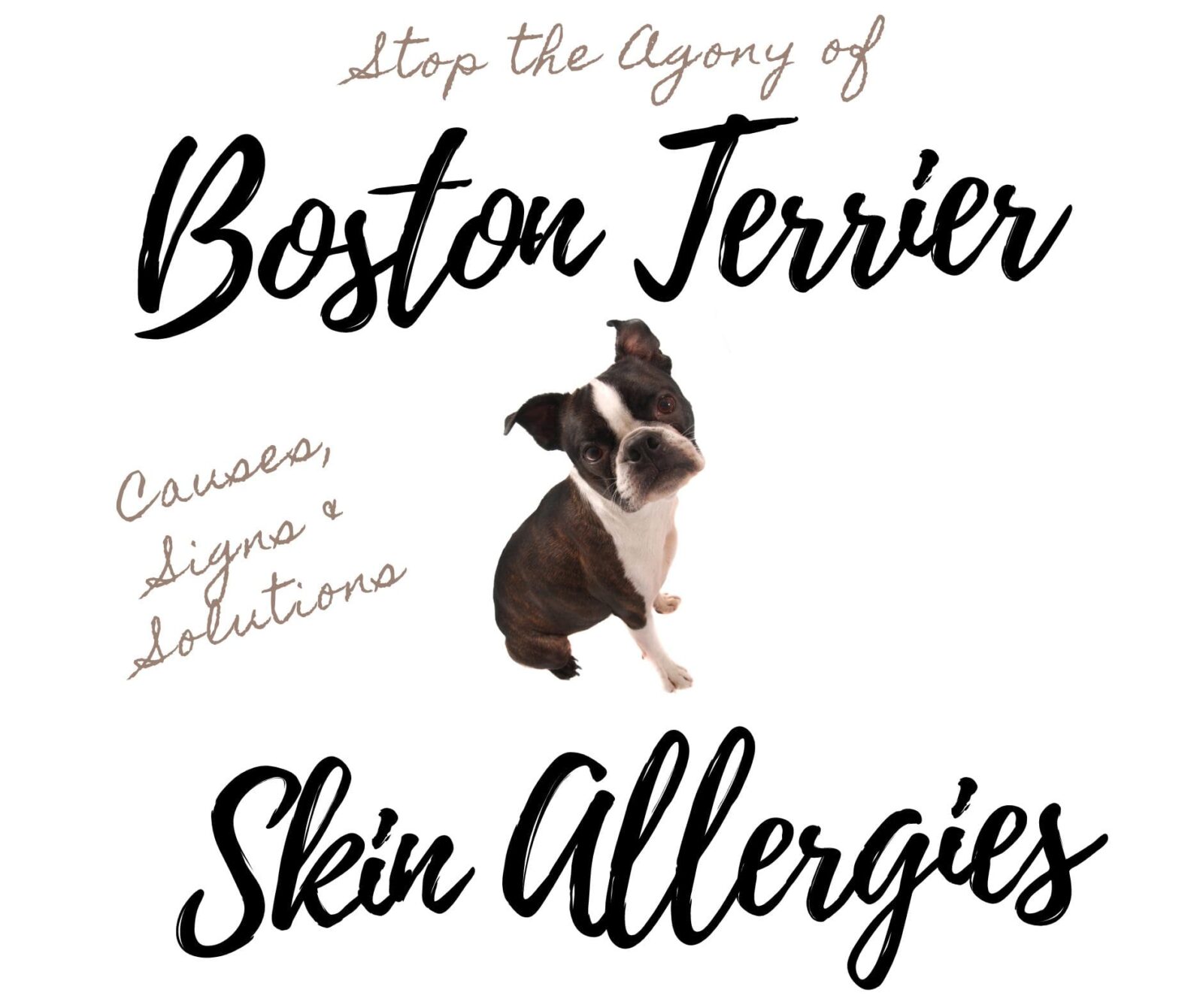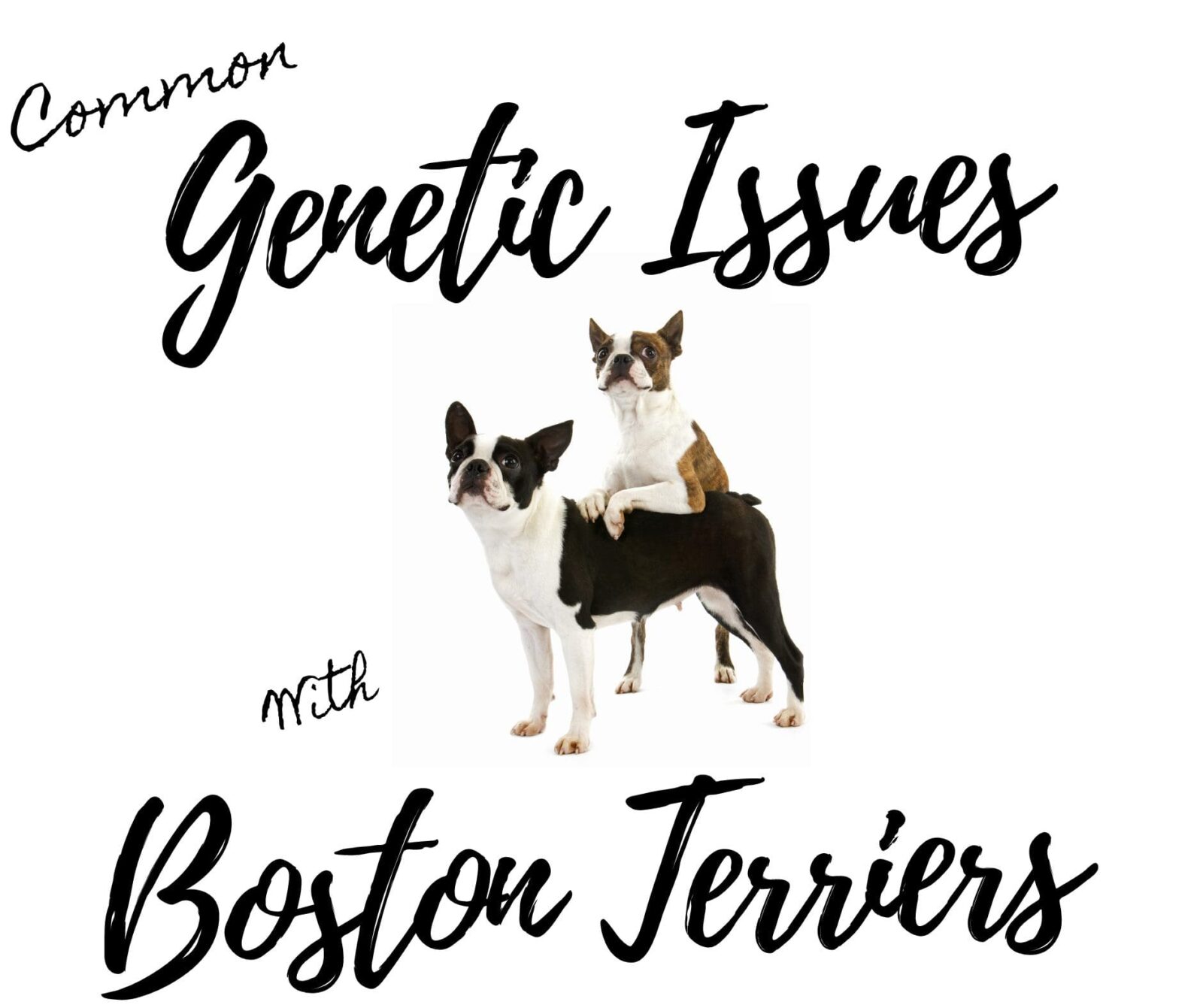Introduction
Boston Terriers, like many other dog breeds, can suffer from environmental allergies also known as atopy. These allergies can result from various environmental factors, and they can cause discomfort and health issues for your beloved pet.
In this article, we’ll explore how to recognize environmental allergies in Boston Terriers, differentiate them from food allergies, manage them effectively, and identify common allergens in your home and backyard.
If you’d like to read more on allergies with Boston Terriers, click here.
Boston Terriers, beloved for their affectionate and playful nature, can face a common yet significant health concern: environmental allergies, also known as atopy. These allergies stem from exposure to a range of environmental allergens prevalent in the surroundings, including pollen, mold, dust mites, and grass. While these triggers might seem innocuous to many, for Boston Terriers, they can provoke allergic reactions that affect their overall well-being.

The symptoms of environmental allergies in Boston Terriers are diverse but frequently manifest as itching, redness, and skin inflammation. The allergic reactions can make these affectionate pets uncomfortable, leading to persistent scratching, skin rashes, and discomfort.
Additionally, affected Boston Terriers may experience respiratory issues, making their day-to-day activities challenging. The severity of symptoms can vary depending on the specific allergen, the individual dog’s immune response, and the exposure level. It’s crucial for pet owners to recognize these signs and seek appropriate veterinary care to improve their pup’s quality of life.
Understanding the intricacies of environmental allergies in Boston Terriers is pivotal for pet owners. This article aims to delve deeper into the causes, symptoms, and management of atopy in Boston Terriers, shedding light on effective ways to support and alleviate the discomfort of these beloved companions.

How to Identify Environmental Allergies in Your Boston Terrier
Environmental allergies in Boston Terriers can manifest through a range of symptoms. Watch out for the following signs that may indicate your dog is suffering from environmental allergies:
Symptoms:
1.Itching and Scratching: Persistent scratching, licking, and biting of the skin, paws, ears, or other parts of the body.
2. Red or Irritated Skin: Inflamed, red, or rash-prone skin, often accompanied by hot spots.
3. Ear Infections: Recurrent ear infections or red, swollen, and itchy ears.
4. Watery Eyes and Runny Nose: Excessive tearing, redness, or a runny nose can be signs of environmental allergies.
5. Sneezing and Coughing: Frequent sneezing, coughing, or wheezing, especially after exposure to certain environments.
6. Hair Loss: Patchy hair loss or thinning of the coat, particularly in the affected areas.
7. Chronic Paw Chewing: Persistent licking or chewing of the paws, sometimes resulting in soreness or discoloration.
Environmental allergies in Boston Terriers can be a significant concern for their health and well-being. These allergies are typically triggered by various environmental factors such as pollen, dust mites, mold spores, and grass. The immune system of a Boston Terrier with allergies reacts excessively to these substances, leading to a range of distressing symptoms.
One of the most common signs of environmental allergies is persistent itching and scratching. Dogs affected by allergies often exhibit intense itching, which can manifest as constant scratching, licking, and biting of the skin, paws, ears, or other parts of their body. This incessant scratching can cause further irritation, redness, and sometimes the development of hot spots on the skin, which are inflamed and painful areas.
The skin issues that arise due to environmental allergies may present as redness, inflammation, or a rash. Affected areas of the skin can become visibly irritated, which is uncomfortable for the dog and concerning for the owner. Additionally, Boston Terriers with environmental allergies may experience recurrent ear infections or have red, swollen, and itchy ears. These ear issues can further contribute to their discomfort and may require ongoing veterinary care and treatment.
Another prominent symptom of environmental allergies is watery eyes and a runny nose. Dogs may experience excessive tearing, redness in the eyes, and a persistently runny nose. This can be uncomfortable for the dog and may also affect their overall quality of life. Sneezing and coughing are also common symptoms, especially after exposure to specific environments or allergens.
Hair loss or thinning of the coat is another visible indicator of environmental allergies in Boston Terriers. The constant scratching and licking can lead to patchy hair loss, making the affected areas more noticeable. Chronic paw chewing is also a concerning symptom, as it can result in soreness or discoloration of the paws, further adding to the discomfort experienced by the dog.
Managing environmental allergies in Boston Terriers involves identifying the specific allergens triggering the reactions and implementing strategies to minimize exposure. This may include regular cleaning, maintaining a hypoallergenic living environment, using prescribed medications to alleviate symptoms, and sometimes dietary adjustments.
Seeking guidance from a veterinarian is crucial for an accurate diagnosis and to develop a comprehensive treatment plan tailored to the individual needs of the Boston Terrier. Early detection and proper management of environmental allergies are essential to ensure the best possible quality of life for these beloved pups.

Differentiating Between Food and Environmental Allergies
It can be challenging to distinguish between food allergies and environmental allergies in Boston Terriers due to similar symptoms. Here are some pointers to help you differentiate:
Consistent Symptoms: If the symptoms persist year-round, it’s likely an environmental allergy, as food allergies often cause consistent symptoms throughout the year.
Seasonal Patterns: Environmental allergies often worsen during specific seasons when certain allergens are more prevalent.
Response to Dietary Changes: If changing your dog’s diet doesn’t alleviate the symptoms, the issue is likely environmental in nature.
Distinguishing between food allergies and environmental allergies in Boston Terriers can indeed be a perplexing task, given the overlap in symptoms. To gain a deeper understanding, it’s crucial to delve into the intricacies of these allergies and how they manifest in these delightful canine companions.
Food allergies in Boston Terriers typically arise from an adverse immune reaction to specific proteins present in their diet. Common allergens for dogs include beef, chicken, dairy, wheat, and soy. The signs of a food allergy can manifest as digestive issues (vomiting, diarrhea), skin problems (itchiness, redness, rashes), and even ear infections. However, what sets food allergies apart is their year-round consistency in symptoms. If your Boston Terrier experiences these symptoms consistently, irrespective of the time of year, a food allergy is a probable culprit.
On the other hand, environmental allergies, often referred to as atopic dermatitis, are triggered by substances in the dog’s surroundings, like pollen, mold spores, dust mites, or dander. These allergies tend to exhibit a seasonal pattern, intensifying during certain times of the year when specific allergens are more prevalent. The symptoms can include itching, watery eyes, sneezing, skin redness, and ear infections. Recognizing when these symptoms worsen can provide valuable clues, assisting in pinpointing environmental allergies.
Furthermore, observing your Boston Terrier’s response to dietary changes can offer crucial insights. If altering the diet does not lead to a noticeable improvement in the symptoms, it’s likely that the issue lies in the environment rather than in the food. Conversely, if modifying the diet and eliminating potential food allergens results in a reduction or cessation of symptoms, a food allergy is more probable.
Consulting a veterinarian specialized in canine allergies is paramount in accurately identifying and managing these conditions. They can conduct tests, such as skin prick tests or blood tests, to identify specific allergens triggering your Boston Terrier’s reactions. This precise diagnosis empowers you to make informed decisions regarding dietary adjustments, environmental modifications, or prescribed medications to enhance your beloved pet’s quality of life and overall well-being.
In conclusion, understanding the nuances between food and environmental allergies in Boston Terriers requires a keen observation of symptoms, recognizing seasonal patterns, and gauging responses to dietary changes. Seek professional guidance to ensure an accurate diagnosis and tailored management plan for your furry friend, providing them with the best possible care for a healthy and happy life.
If you are still not sure what is causing the symptoms, consider a pet allergy test. You can order it right on Amazon, and it will be worth its weight in gold in finally getting to the bottom of your Boston Terriers’ discomfort. The UCARI Pet Sensitivity & Intolerance Test Kit is comprehensive and tests for both food allergies and environmental allergies with 48 hour results. This is an absolute godsend if you cannot afford in office testing by a veterinarian.
Managing Environmental Allergies in Boston Terriers
Managing environmental allergies in Boston Terriers involves a multi-faceted approach:
Consult a Veterinarian: Seek professional advice to confirm the allergy and discuss appropriate treatment options.
Allergy Testing: Consider allergy testing to identify specific allergens triggering your dog’s symptoms.
Avoidance: Reduce exposure to allergens by keeping your dog indoors during high pollen seasons and minimizing contact with known allergens.
Regular Grooming: Bathe and groom your dog regularly to remove potential allergens from their fur and skin.
Antihistamines: Your vet may recommend antihistamines, such as Benadryl, to relieve mild allergy symptoms.
Immunotherapy: Allergy shots or drops can help desensitize your dog’s immune system to specific allergens.
Managing environmental allergies in Boston Terriers requires a comprehensive and well-rounded approach to ensure the well-being and comfort of your dog. First and foremost, it is essential to consult a veterinarian for professional guidance and confirmation of the allergy, as well as to discuss appropriate treatment options based on the severity and nature of the allergic reactions.
Allergy testing is a crucial step in understanding the specific allergens that trigger your dog’s symptoms. This information allows for a more targeted approach to managing the allergies. Identifying the allergens helps you to implement effective strategies to reduce your dog’s exposure to them.
Avoidance is a key aspect of managing environmental allergies, and you can achieve this by keeping your Boston Terrier indoors during high pollen seasons and minimizing their contact with known allergens like dust mites, molds, and grass.
Regular grooming is an essential component of managing allergies in dogs. Bathing and grooming your dog on a consistent basis helps remove potential allergens such as pollen and dander from their fur and skin. Additionally, maintaining a clean living environment, including regular vacuuming and washing of your dog’s bedding, can significantly contribute to reducing allergen exposure.
Depending on the severity of the allergies, your veterinarian may recommend antihistamines like Benadryl to alleviate mild allergy symptoms and provide your dog with relief. In more persistent cases, immunotherapy in the form of allergy shots or drops may be advised. These treatments work to desensitize your dog’s immune system to specific allergens over time, ultimately reducing the severity of allergic reactions.
In summary, managing environmental allergies in Boston Terriers necessitates a comprehensive approach involving professional consultation, allergy testing, allergen avoidance, regular grooming, and appropriate medical interventions like antihistamines or immunotherapy. By diligently implementing these strategies, you can enhance the quality of life for your Boston Terrier and minimize the impact of environmental allergies on their health and happiness.

Identifying Common Allergens in Your Home
To mitigate environmental allergies in your Boston Terrier, it’s crucial to identify and eliminate common allergens within your home. Common potential indoor allergens include:
Dust Mites: Found in bedding, carpets, and upholstery. Among the most prevalent indoor allergens are dust mites, tiny creatures that thrive in bedding, carpets, and upholstery. Their microscopic fecal matter and body fragments can become airborne, posing a considerable risk to dogs, especially those prone to allergies.
Mold: Common in damp areas like basements, bathrooms, and kitchens. Mold is a culprit, often found in damp or poorly ventilated areas like basements, bathrooms, and kitchens. The spores released by mold can be inhaled by your Boston Terrier, potentially exacerbating allergic reactions and respiratory distress.
Pollen: Carried indoors on clothing, shoes, and through open windows or doors. Pollen, though originating outdoors, frequently makes its way into homes on clothing, shoes, or through open windows and doors. This allergen can easily cling to your pet’s fur, triggering allergic attacks.
Pet Dander: Lastly, pet dander, composed of skin flakes, fur, or feathers from pets, is a common indoor allergen. Understanding and managing exposure to these allergens is key to creating a healthier and more comfortable environment for your pup.
Environmental allergies can significantly impact the well-being and comfort of your beloved Boston Terrier. These allergies, often triggered by various indoor allergens, can manifest in symptoms ranging from itchiness, sneezing, and watery eyes to more severe respiratory issues. To provide your Boston Terrier with the best quality of life, it’s vital to take proactive measures in identifying and minimizing these common household allergens.

Yard Allergens and Grass Allergy in Dogs
Boston Terriers can also be allergic to various yard allergens:
Grass Pollen: Grass pollen is a significant outdoor allergen that can cause allergic reactions in dogs, including itching, sneezing, and watery eyes. Grass pollen, a prevalent outdoor allergen, stands out as a significant trigger for allergic reactions in dogs, including the distressing symptoms of itching, sneezing, and watery eyes. The verdant lawns and open spaces where our Boston Terriers love to frolic can unfortunately harbor this allergen, subjecting them to discomfort and irritation.
Weeds and Trees: Pollens from weeds and trees can also trigger allergic responses in sensitive dogs. Beyond grass pollen, a host of other yard allergens can also elicit allergic responses in these sensitive canines. Pollens from various weeds and trees, commonplace in outdoor environments, can be particularly troublesome for Boston Terriers with heightened sensitivity.
These plants release pollens into the air, especially during their respective blooming seasons, making it challenging for our furry companions to escape their airborne particles. As these allergens infiltrate the environment our Boston Terriers inhabit, they may experience a range of allergic symptoms, diminishing their overall quality of life.
Environmental allergies can profoundly impact the well-being of our beloved Boston Terriers. Among the myriad allergens that can provoke allergic reactions in these affectionate companions, yard allergens take a prominent place.
Understanding these yard allergens and their potential impact on our Boston Terriers is crucial for ensuring their well-being and implementing appropriate strategies to alleviate their allergic burden.

A Word About Checking Your Boston Terrier for Nasal Mites
If you take your Boston to the vet for allergies, don’t forget to ask them to check for nasal mites – gross, huh?
Diagnostic Procedures: Nasal mites can be diagnosed through microscopic examination of nasal discharge or skin scrapings.
Nasal mites, scientifically known as Pneumonyssoides caninum, are tiny parasitic arthropods that infest the nasal passages and sinuses of dogs. These mites can cause irritation, discomfort, and potential health issues for the affected canine. They are a type of ectoparasite, meaning they live externally on the host. The nasal passages of a dog provide an ideal environment for these mites to thrive due to the warmth and moisture present.
Nasal mites typically enter a dog’s nasal passages through the inhalation of contaminated dust, soil, or infected respiratory secretions from other animals. In some cases, direct contact with an infected dog can also transmit nasal mites.
Once in the nasal passages, the mites feed on tissue and cause inflammation, leading to symptoms such as nasal discharge, sneezing, nasal irritation, and in severe cases, difficulty breathing.
The seriousness of a nasal mite infestation depends on various factors, including the dog’s overall health, the extent of the infestation, and how the dog’s immune system responds. While nasal mites can cause discomfort and distress to the dog, they are generally not considered life-threatening.
However, if left untreated, the chronic irritation and inflammation caused by nasal mites can lead to secondary bacterial infections or exacerbate underlying respiratory conditions, making timely diagnosis and treatment important.
Treatment for nasal mites typically involves medication prescribed by a veterinarian. Common treatments may include topical or systemic antiparasitic medications to kill the mites, along with anti-inflammatory drugs to reduce inflammation and discomfort.
Antibiotics may also be prescribed to treat any secondary bacterial infections that may have developed due to the irritation caused by the mites. It’s crucial to follow the prescribed treatment plan and administer the medications as directed by the veterinarian to effectively eliminate the nasal mites and alleviate the dog’s symptoms.
Regular check-ups with a veterinarian are essential to monitor the dog’s progress during and after treatment and ensure that the nasal mites have been effectively eradicated.
Additionally, maintaining a clean living environment for the dog and addressing any underlying health conditions that may have contributed to the infestation can help prevent future occurrences of nasal mites.
Conclusion
In conclusion, understanding environmental allergies in Boston Terriers is vital for ensuring the well-being and comfort of your furry companion.
Regular monitoring, professional guidance, and appropriate management strategies can help alleviate your dog’s allergy symptoms and improve their overall quality of life. Always consult a veterinarian for accurate diagnosis and tailored treatment plans for your Boston Terrier’s specific needs.

https://www.princessanimalhospital.com/food-allergies-vs-seasonal/
This post contains affiliate links. I earn from qualifying Amazon purchases.




